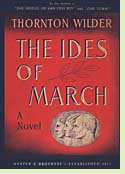The Ides of March
by Thornton Wilder
Reviewed by David Maclaine

Most of us know the author of The Ides of March. Actually there's more than one historical novel with that name, but I'm talking about the one by Thornton Wilder, and no matter how hard you try to skate through high school without paying attention, you probably can't escape Our Town. Some of us even remember reading The Bridge of San Luis Rey, the novel about chance and fate that won Wilder a Pulitzer Prize. If you're a musical theater buff you may even know that his play The Matchmaker was a stage success before it was adapted into Hello, Dolly! What I'm saying is that Wilder has a slightly more imposing pedigree than your average writer of historical fiction. So when he chooses to write an epistolary novel set in the months leading up to the assassination of Julius Caesar, you've got to be curious about the result.
Wilder called The Ides of March "a fantasia on certain events and persons of the last days of the Roman republic." It is clearly a fantasia in the key of C: the chief characters whose letters we read or whose actions we read about are Caesar, Cleopatra, Clodia and Catullus. The author even stretches to include two more "C" names, treating Cato as though he's still alive and inserting an episode from decades earlier involving Clodius, even though, as the author cheerfully admits in his foreword, both of them were actually dead by the time of the novel. But these willful twists to history are secondary. The core of the novel is the stormy relationship of the poet Catullus and his sometime mistress and muse Clodia, which draws a more fascinated gaze from Caesar than the petty maneuvers by which Cleopatra tries to make her mark in Rome. It's that deep look at the power of obsessive love and its relation with great art that gives the novel weight and poignancy. With any luck it should spur you, as it did me, to take another look at Catullus' poems. (1948, 246 pages)
More about The Ides of March at Powell's Books, Amazon.comThe Ides of March appears on the list of The 50 Best Historical Novels for a Survey of Ancient Roman History
Other novels about Caesar's assassination:
The October Horse by Colleen McCullough (2002), about Julius Caesar's intervention in Egypt and his return to Rome and his assassination; #6 in the Masters of Rome series. See review and more info at Powell's Books
Antony by Allan Massie (1997), about Mark Antony, one of the assassins of Julius Caesar, and his struggle with Octavian for leadership in Rome after Caesar's death. More info
The Ides of March by Valerio Massimo Manfredi (2009), a political thriller set during the last days of Julius Caesar. More info
Nonfiction about the assassination of Julius Caesar:
Lives of the Twelve Caesars by Gaius Suetonius Tranquillus (121 A.D.). More info
The Assassination of Julius Caesar by Michael Parenti (2003). More info
Et Tu Brute? - The Murder of Caesar and Political Assassination by Greg Woolf (2007). More info
Online:
"The Assassination of Julius Caesar," a YouTube video of a talk by Michael Parenti, author of The Assassination of Julius Caesar, which scathingly analyzes the Roman Empire from the perspective of class struggle
Back to Novels of Ancient History
Back to Directory of Book Reviews